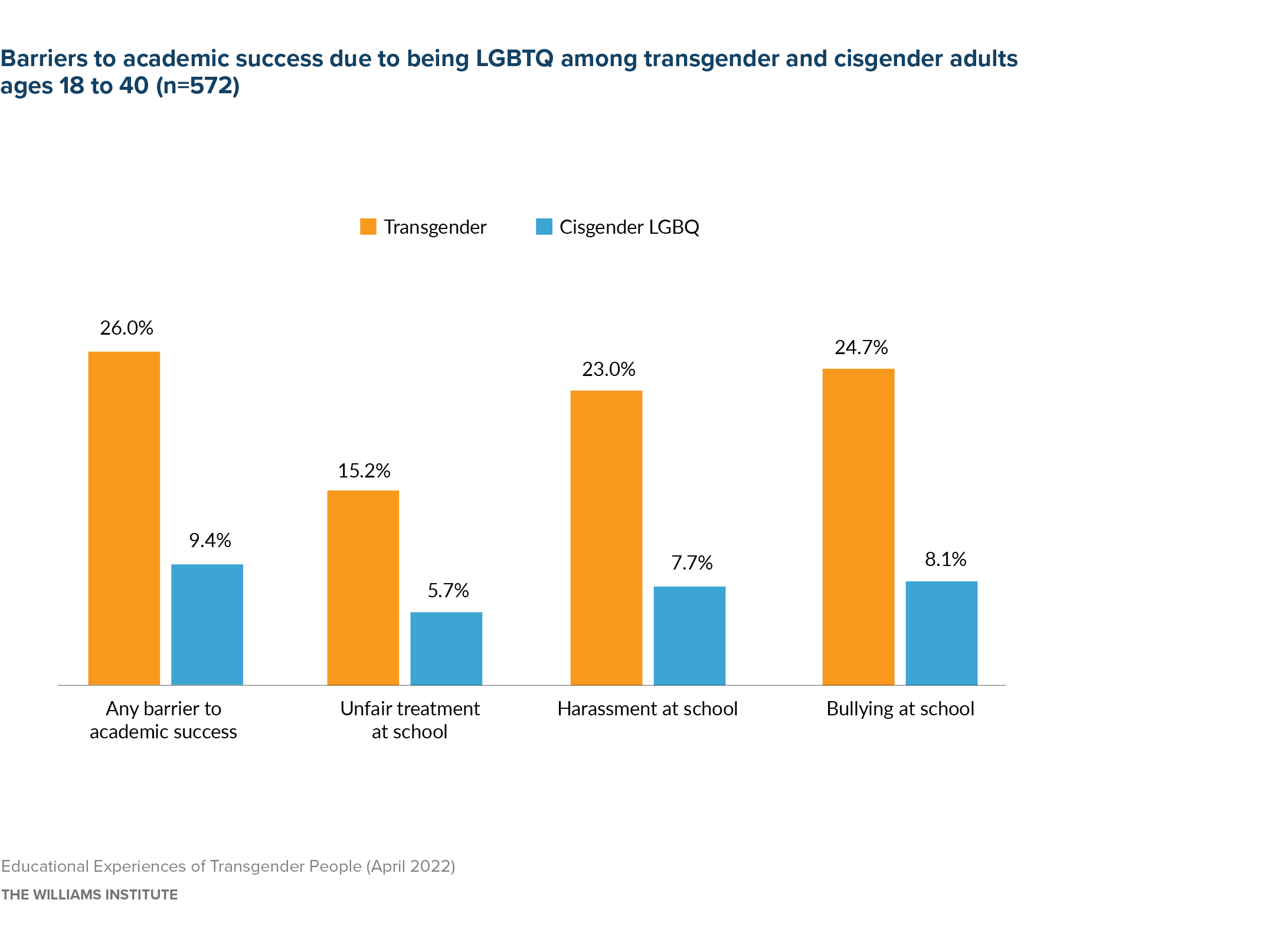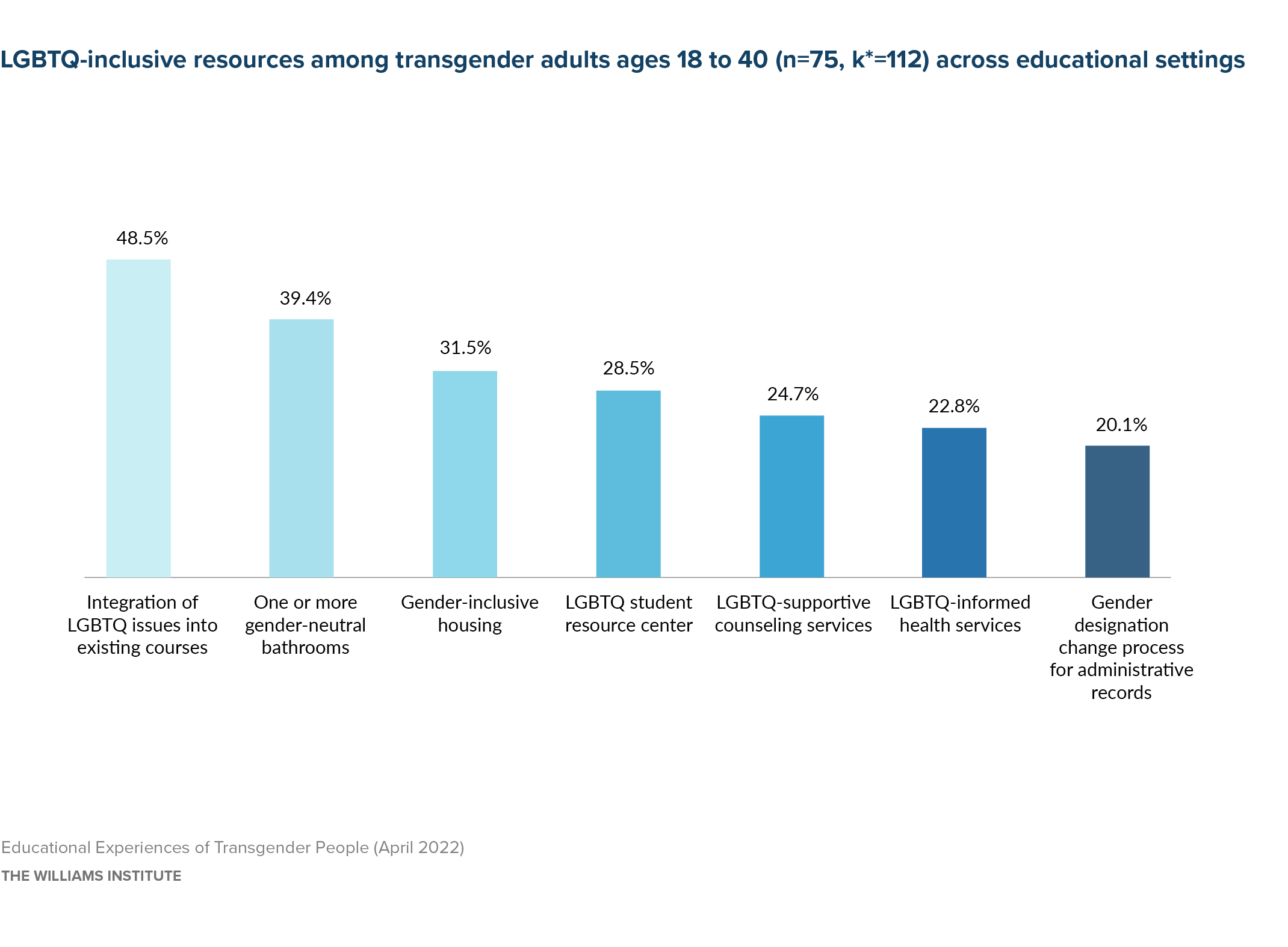Executive Summary
There are an estimated 218,000 transgender students ages 18 to 40 in the U.S. However, relatively little is known about the experiences of transgender people in higher education environments. This study uses data collected from a nationally representative sample of adults ages 18 to 40 (N=1,072) on the Access to Higher Education Survey to examine the school experiences and higher education environments of transgender people. Cisgender LGBQ adults and non-LGBQ adults are sometimes included as comparators. Information is provided about belonging, outness and hiding, school-based adversity, LGBTQ- and gender-inclusiveness of higher education environments, and sources of financial support.
A small but representative group of transgender men, women, and non-binary people (n=75) ages 18 to 40 answered questions about their experiences in school settings over their lives. One in five (20.9%) transgender people had ever attended vocational, technical, or trade (hereafter vo-tech) programs, 42.7% had been to community college, 59.7% had been to four-year college, and 9.2% had been in graduate school. One in five (20.8%) transgender people chose a school in a different city or state from where they grew up because they thought it would be more welcoming of someone like them. Nearly a third (32.4%) of transgender participants were current students at the time of survey completion.
Transgender adults reported experiences of not fully belonging, needing to hide their sexual orientation or gender identity at school because they are LGBTQ, and experiences of unfair treatment, harassment, or bullying that impacted the quality and quantity of their education. Three times as many transgender people reported lifetime adverse treatment at school that impacted their academic success or educational attainment as cisgender LGBQ people. Nearly a third of transgender people reported unfair treatment by teachers, staff, or school administrators across all of the types of higher education institutions that they had attended. And more than a third experienced bullying, harassment, or assault in higher education settings. Findings from this study demonstrate that experiences of discrimination against transgender people are not unique to high school and also occur in higher education settings.
More than half of transgender people reported that their mental health was not good all or most of the time that they were in school across all types of higher education institutions. And yet, no more than a quarter reported the presence of LGBTQ-supportive counseling services or LGBTQ-informed health services at their schools. More broadly, LGBTQ- and gender-inclusive resources were reported by relatively few people.
Key Findings
Two out of five (42.5%) transgender people and one of our four (24.7%) of their LGBQ cisgender peers ages 18 to 40 indicated that they felt they did not fully belong at school at some point in their lives because they are LGBTQ. When asked whether they felt a sense of belonging in specific higher education settings, only three out of five (59.2%) transgender people reported a sense of belonging across the higher education institutions that they had attended. Fewer transgender people reported belonging in vo-tech programs and community colleges as reported belonging in four-year college and graduate schools (44.9% vs. 72.5%, respectively). More than one in seven (14.9%) transgender people did not feel safe at school across the higher education institutions that they had attended.
Just over half (51.7%) of all LGBTQ people reported ever needing to hide their sexual orientation or gender identity at school because they are LGBTQ. Only one in five (21.4%) transgender people was “out” as LGBTQ to most or all of their teachers/faculty and program staff across higher education institutions that they had attended; 44.1% were out to no faculty or staff. Outness to other students was somewhat higher than to faculty/staff and differed across school settings. Across settings, almost a third (31.5%) of transgender people reported being out to no other students. More transgender people were out to more students in four-year college and graduate schools than in vo-tech and community colleges.
Nearly a third (32.1%) of transgender people reported any unfair treatment by teachers, staff, or school administrators across the higher education institutions that they had attended. More than a third (38.8%) had experienced any bullying, harassment, or assault in higher education settings. Over a quarter of transgender (26.0%) and almost one in ten (9.4%) LGBQ cisgender people reported that lifetime school-based unfair treatment, harassment, or bullying due to being LGBTQ was a barrier to their academic success.

